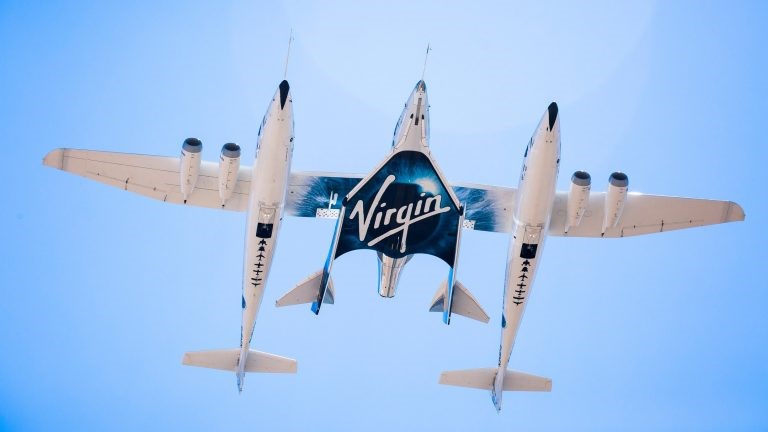The dream of today is the reality of tomorrow, and space tourism is a classic example of how the human race is unlocking the full potential of its capabilities to learn and explore outer space. A decade ago, space tourism consisted of a handful of companies, with Space Adventures at the forefront of this emerging market. One of the early triggering factors of the space tourism investment was the joint success of Roscosmos State Corporation for Space Activities (Roscomos) and Space Adventures. In the early 21st century both Space Adventures and Roscomos achieved success in short tourist flight to the International Space Station (ISS). And these commercial movements developed huge interest among the investors, which also ultimately led to the rise of companies like the Virgin Galactic.
With the acceleration in research, development, and commercialization of space technology, space tourism is becoming a strong commercial pillar of the space industry.
 |
| Virgin Galactic’s SpaceShip 2 will be carrying passengers to space as early as this year |
With respect to the recent developments, there are only handful number of government and private players in the market; with the Russian government showcasing consistent interest in developing space tourism capabilities. In January 2021, Glavkosmos, the commercial arm of Roscosmos, has announced that it will be selling four seats on Soyuz MS spacecraft with an aim for launch in 2022 and 2023, respectively. This complete commercial landscape of space tourism is currently concentrated in the low-earth orbit (LEO). Along with LEO tourism, Richard Branson’s Virgin Galactic is gearing up to commercialize the suborbital tourism vertical. The company has already registered more than 600 customers (USD 225,000 per ticket) for its SpaceShipTwo suborbital flight. Though the company’s plans are consistently delayed over the decade, the rising demand for space tourism will present the opportunity to accelerate its operations for the first suborbital flight carrying a group of passengers. While many challenges and opportunities lie ahead of this sector, the rapid innovation pace is increasing the sphere of opportunity for private players in this domain. To receive more insights on how space tourism will benefit and trigger commercial demand across key space and satellite market verticals, let’s dissect each of the following points:
Launchers and Satellites
New Space technologies have fueled innovation in the satellite sector. With satellite communications at the forefront of unlocking the commercial sphere of the communications market. Lesser the satellite’s weight, lower will be the launch cost; ultimately decreasing the end-user data prices. This is one of the huge technological innovation that satellite industry has seen till date. And with the emerging LEO and medium-earth orbit (MEO) satellite constellations, the launch segment has started evolving at a much rapid pace. Considering the contribution of space tourism, heavy launchers will be soon entering the market (and the demand is rising), ultimately launching multiple satellites and tourists at a much lower cost. SpaceX is one of the companies that has created a competitive ecosystem in the launch segment with its reusable rocket technology. Though SpaceX’s Falcon Heavy launcher is currently carrying astronauts to the International Space Station (ISS), it’s Starship will be carrying a group of passengers to the space.
Infrastructure Management
Extreme environment architecture and design have always been a crucial part of the space industry, but over the years, it has received little or no media limelight. Space tourism is increasing the demand for space architecture and design to carefully curate and build the future commercial space station in LEO and habitats on the moon. Axiom Space, a US-based private aerospace manufacturer and orbital spaceflight services company, is planning to build a private space station orbiting 250 miles above earth. Recently, Axiom Space also received USD 130 million funding for its existing work on private space station. Similarly, Orion Span’s Aurora Space Station and Bigelow Aerospace’s Next-generation Commercial Space Station, are some of the emerging companies that will be soon reshaping the commercial aspects of the space station. These future commercial space station will be slowly opening the space hospitality market to host tourists; ultimately making infrastructure management crucial for space tourism sector.
Research & Development
The demand for more private space stations is not triggered by the upstream space market, but by the downstream terrestrial industries. Genetics, medicine, meteorology, and many more are the key fields of research triggering the demand for private space station. Till now ISS has recorded more than 100 companies sending their respective payload for research purposes in space. The hospitality infrastructure initiated due to space tourism, will also be acting as a live research laboratory for research and development purposes. Axiom Space is one of the companies aiming to host research experiments in its private space station laboratory.
Media and Entertainment
Media and entertainment industry will be soon embracing the new change of ecosystem to participate and produce content in space. Tom Cruise has officially declared that he will be travelling to ISS along with the Director Doug Liman to direct the first ever movie shot in space. Both Cruise and Liman will be travelling to ISS, as a part of SpaceX Axiom Space-1 mission. Media and entertainment industry have been an integral part of satellite broadcasting industry for decades. With the ongoing development in the space tourism, once again this industry is set engage in providing significant commercial opportunities for private space station and spaceflight companies.
Future Scope
Space tourism vertical can also be an opportunity for several companies and agencies to increase their investment outlook in the space technology segment. For example, the rise of SpaceX’s Dragon, a reusable cargo spacecraft, has made USA less dependent on the Soyuz for the ISS activities. Therefore, Russia’s developing interest in space tourism can be considered as a strategic move to revamp its launch business and increase commercial investments in the launch segment. This model of amplifying the business on the existing capabilities can be a potential opportunity to monetize and invest in the development of new space technologies. The future of space tourism looks promising, yet the execution of the plans laid out for actual launch by several agencies and companies, will accordingly shape the future investment landscape of this sector.
Conclusion
Space tourism companies are consistently progressing towards achieving their ambitious goals, and the current technologies are making it possible to shape commercial plans. According to NSR’s latest space tourism forecast, this industry will generate revenues worth USD 7.9 billion by 2030. Considering the investment landscape, space tourism is on the verge to become one of the strong commercial space market verticals in the coming decade. The significant rise in demand for moon and mars missions is also paving way for private commercial space stations to build and host experiment of the government and private organizations/companies. Though several challenges are presented to execute these ambitious plans, space tourism is simultaneously helping several space and satellite market verticals to participate, innovate and experiment on new technologies. In the coming years, it is evident that the space tourism market will also be the hotbed of opportunities for investors and companies aiming to build habitats on the moon and mars.
----------------------------------
 Omkar Nikam is an independent space and satellite consultant based in Strasbourg, France. He has eight years of experience in technology and business consulting. He is also the EMEA correspondent for Satellite Markets & Research, USA. Omkar specializes in market research, analysis, and consulting services for several space and satellite market verticals. He can be reached at: www.oknikam.eu
Omkar Nikam is an independent space and satellite consultant based in Strasbourg, France. He has eight years of experience in technology and business consulting. He is also the EMEA correspondent for Satellite Markets & Research, USA. Omkar specializes in market research, analysis, and consulting services for several space and satellite market verticals. He can be reached at: www.oknikam.eu





